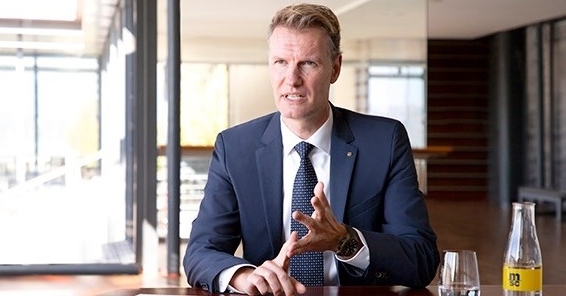Collaboration key for decarbonisation, says MSC's Toft
It is critical that priority this year is not only to respond to the huge demand being experienced in the very complex, congested markets that emerged amid Covid but also to ensure that it is not decoupled from the efforts to decarbonise, says Mediterranean Shipping Company (MSC) CEO Soren Toft.

January 13, 2022: It is critical that priority this year is not only to respond to the huge demand being experienced in the very complex, congested markets that emerged amid Covid but also to ensure that it is not decoupled from the efforts to decarbonise, says Mediterranean Shipping Company (MSC) CEO Soren Toft.
"Collaboration is key in order to achieve the aspirational decarbonisation goals set out by the shipping industry,” Toft said while delivering the keynote speech at DNV’s Fuel of the Future Conference earlier this week as part of the annual Nor-Shipping convention. “MSC itself already fosters industry-wide as well as cross-sector collaboration in order to enable the massive investment needed to decarbonise shipping. While the company continues to invest in low-carbon technologies and explore different fuel options, carriers in general continue to struggle from a lack of solutions available at scale,"
As shipping volumes have grown over the years, so have the environmental emissions produced as a by-product of delivering goods around the world. "Nowadays, the rate at which emissions are rising has started to decline but there is much still to do to make tackling climate change a global imperative. Container lines such as MSC must continue to do their part to help mitigate the impact of climate change while continuing to operate responsibly in meeting the ever-increasing demand for global trade."
With the cost of decarbonising shipping estimated at trillions of dollars, carriers must make expensive capital decisions that will live on for decades, Soft added. "Urgent investment and a better understanding of how business and society will share the cost burden is also required. The transition to a low-carbon economy requires broad collective action and productive partnerships with our stakeholders across and beyond shipping.”
Maersk cuts zero carbon target by 10 years; Hapag will reduce CO2 intensity by 30%
The speech assumes significance as Maersk had announced that it is reducing the net carbon zero target by 10 years. Tangible near-term targets for 2030 include a 50 percent reduction in emissions per transported container in the Maersk Ocean fleet and a 70 percent reduction in absolute emissions from fully controlled terminals.
To achieve decarbonisation by 2050, the shipping industry will have to use at least 5 percent zero-emission fuels by 2030, says Janin Aden, Senior Director, Sustainability, Hapag-Lloyd. "Hapag-Lloyd aims to reduce the CO2 intensity of its entire fleet by 30 percent by 2030. By 2045, we are determined to make the operation of our ships completely climate-neutral."
Climate-neutral fuels will be the most effective way to reduce CO2 emissions in shipping to a minimum, Aden added. "However, at this time, there are a great deal of related investment uncertainties. In fact, right now, we don’t even know which climate-neutral fuels will be available in the future in sufficient quantities.
"Since the investment cycles of container ships are usually around 25 years, it is clear that every new ship that is ordered from now on will need to be designed to meet future requirements. Given the huge investment sums for new ships and the current uncertainty regarding which fuels will ultimately emerge as the dominant ones, ship propulsion systems must allow for as many options as possible."
Preventing greenwashing
"Green financing is about promoting decarbonisation while creating appropriate financial incentives at the same time, says Aden. "These financings are currently in high demand: in what is a genuine win-win situation, companies benefit from a price advantage for projects geared towards sustainability. But for this type of financing to work, there must be high standards – and no greenwashing. In this case, the lending banks take on a gatekeeper role, as they are the ones who ultimately ensure that green is truly green."



